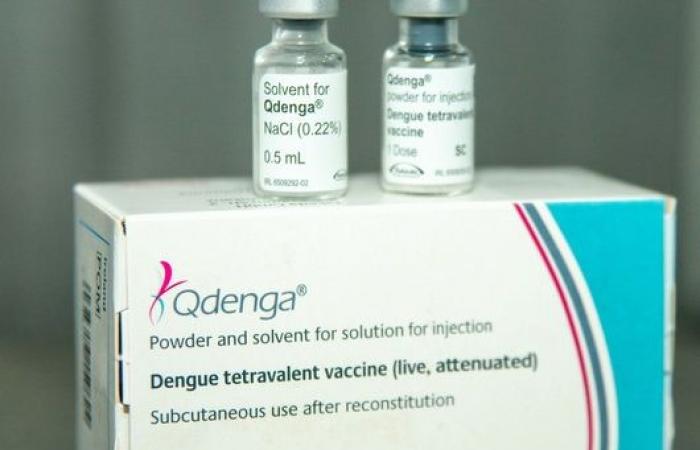Claro dos Poções, Itacambira, Glaucilândia, Juramento, Mirabela and Montes Claros are the first six municipalities in the North of Minas that will receive the first shipment of 28 thousand 329 doses of dengue vaccines. The decision was taken on Thursday, 4/25, by the Ministry of Health (MS), which expanded vaccination to another 625 municipalities in six states. The new regions will be awarded the fourth shipment of 986.5 thousand doses, which will also be destined for municipalities that had previously been included as priorities for vaccination against dengue, as they have a high incidence of transmission of the disease.
For municipalities that are part of the area of operation of the Regional Health Superintendence (SRS) of Montes Claros, the transfer of the first shipment of dengue vaccines was defined as follows: Montes Claros (26 thousand 309 doses); Mirabela (850); Claro dos Poções (474); Itacambira (277); Juramento (248) and Glaucilândia (171).
Agna Soares da Silva Menezes, coordinator of health surveillance and the Center for Strategic Information in Health Surveillance (Cievs), at SRS Montes Claros, highlights the importance of including municipalities in the North of Minas in vaccination against dengue, taking into account the high incidence of disease transmission in the region.
“This year, of the 86 municipalities that make up the health macro-region of Northern Minas, only Verdelândia has an average incidence rate of diseases transmitted by the Aedes aegypti mosquito. The other locations have a high or very high incidence rate”, observes the coordinator.
Agna Menezes warns that the dengue vaccine opens up good prospects for controlling the disease, “but municipalities and the population in general will not be able to give up on eliminating Aedes aegypti proliferation points. This is because, in addition to dengue fever, the mosquito transmits several other diseases, including chikungunya, zika and yellow fever.”
According to the Ministry of Health, with the expansion of municipalities that will have vaccines against dengue, 1,300 locations across the country will be eligible for vaccination. “It is important to highlight that we are following the list of regions previously agreed with the health managers of the states and municipalities”, explains the Secretary of Health and Environment Surveillance at the Ministry of Health, Ethel Maciel.
The distribution of doses in the municipalities was determined based on three criteria: ranking of health regions and municipalities; required quantity of doses, according to the availability predicted by the manufacturer, and the calculation of the total doses to be delivered in a single shipment to the municipalities.
The vaccines intended for the application of the second dose will be sent to municipalities considering the recommended interval of three months to complete the vaccination schedule.
Strategy
Brazil is the first country in the world that, as of February this year, began offering the dengue vaccine in the universal public system. The Ministry of Health incorporated the vaccine into the Unified Health System (SUS) in December 2023.
Initially, the vaccine began to be applied to the population in endemic regions, in 521 municipalities. The process was organized with the participation of the National Council of Health Secretaries (Conass) and the National Council of Municipal Health Secretaries (Conasems), following the recommendations of the Technical Advisory Chamber on Immunization (CTAI) and the World Health Organization ( WHO).
The methodology used had as its starting point large municipalities (population equal to or greater than one hundred thousand inhabitants) with high dengue transmission in the last ten years. The health regions in which these municipalities were included were selected and ordered according to the following criteria: predominance of serotype 2 (December 2023) and highest number of cases in the 2023/2024 monitoring. As a result, 16 states and the Federal District had municipalities that met the requirements to start vaccination from this year.
Children and adolescents between 10 and 14 years old are being vaccinated, the age group that has the highest number of hospitalizations due to dengue fever (16.4 thousand from January 2019 to November 2023), after the elderly, a group for which the vaccine is not available. was authorized by the National Health Surveillance Agency (Anvisa). The vaccination schedule consists of two doses, with an interval of three months between them.
The definition of a target audience and priority regions for immunization was necessary due to the limited capacity to supply doses by the vaccine manufacturing laboratory. The first shipment with around 757 thousand doses arrived in Brazil on January 20th. For this year, the Ministry of Health acquired the total amount available from the manufacturer: 5.2 million doses, which will be delivered by December of this year. For 2025, the Ministry of Health has already contracted the purchase of another nine million doses of vaccines.
Scenario
So far, Brazil has recorded 3.8 million probable cases of dengue this year, 40,400 of which are serious and an alarm signal. 1,700 deaths have already been reported due to the disease.
In Minas Gerais, until the 19th of this month, more than 1.1 million probable cases of dengue were reported, of which 479 thousand were confirmed through laboratory tests. Furthermore, this year, the state has recorded more than 8,200 serious cases of dengue, 280 confirmed deaths and 715 under investigation.
On the other hand, of a total of 73,741 dengue cases reported this year in the North of Minas, 16,243 cases were confirmed through laboratory tests. There were 258 serious cases of dengue or with warning signs; 18 deaths have been confirmed and 19 are under investigation. The municipalities with confirmed deaths are: Montes Claros and Januária (5 cases in each location); Bocaiuva (3); Engenheiro Navarro, Salinas, Pirapora, Várzea da Palma and Buritizeiro (one death in each municipality).
The scenario of arboviruses this year in the North of Minas also shows that 96% of dengue cases reported in 54 municipalities in the SRS Montes Claros area were caused by serotype 1 (96%) and the remainder by serotype 2. However, through viral isolation, the circulation of dengue serotype 3 was detected in the municipality of Salinas.
As for chikungunya, as of April 19th, the North of Minas had 2,845 reported and 478 confirmed cases. Regarding Zika, there are 37 probable cases of the disease in the region, of which two have been confirmed.
By Pedro Ricardo – Photo: Fábio Marchetto/Agência Minas
Tags: Expansion dengue vaccination includes municipalities Montes Claros Region
--





